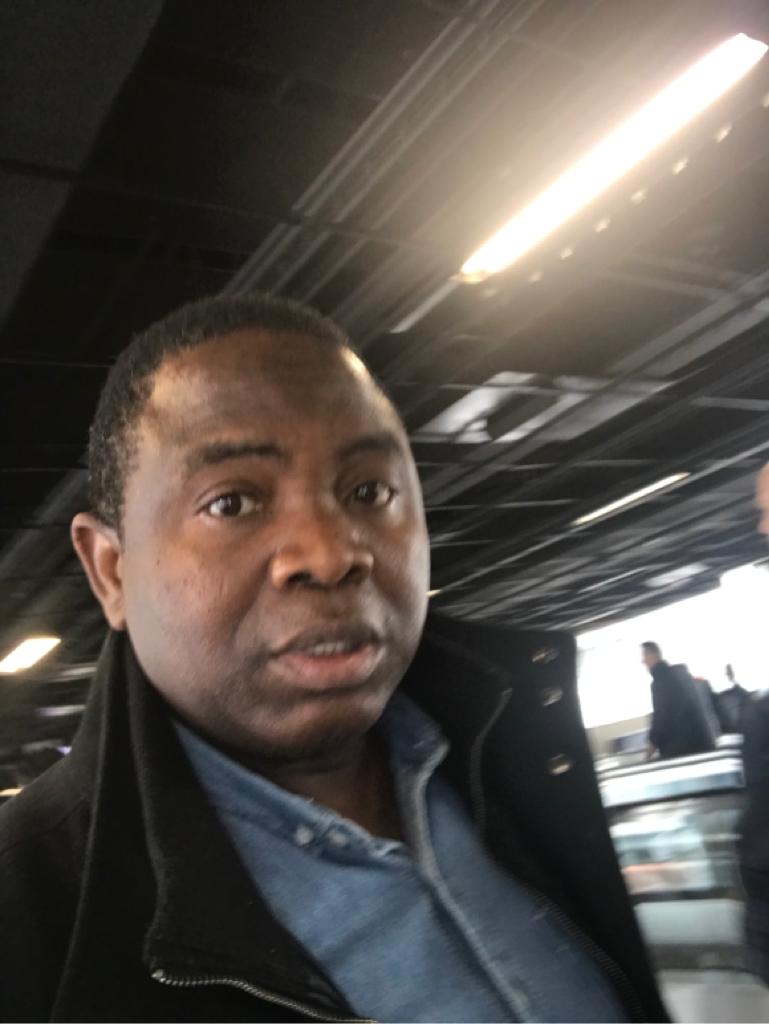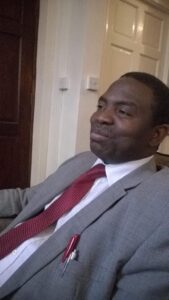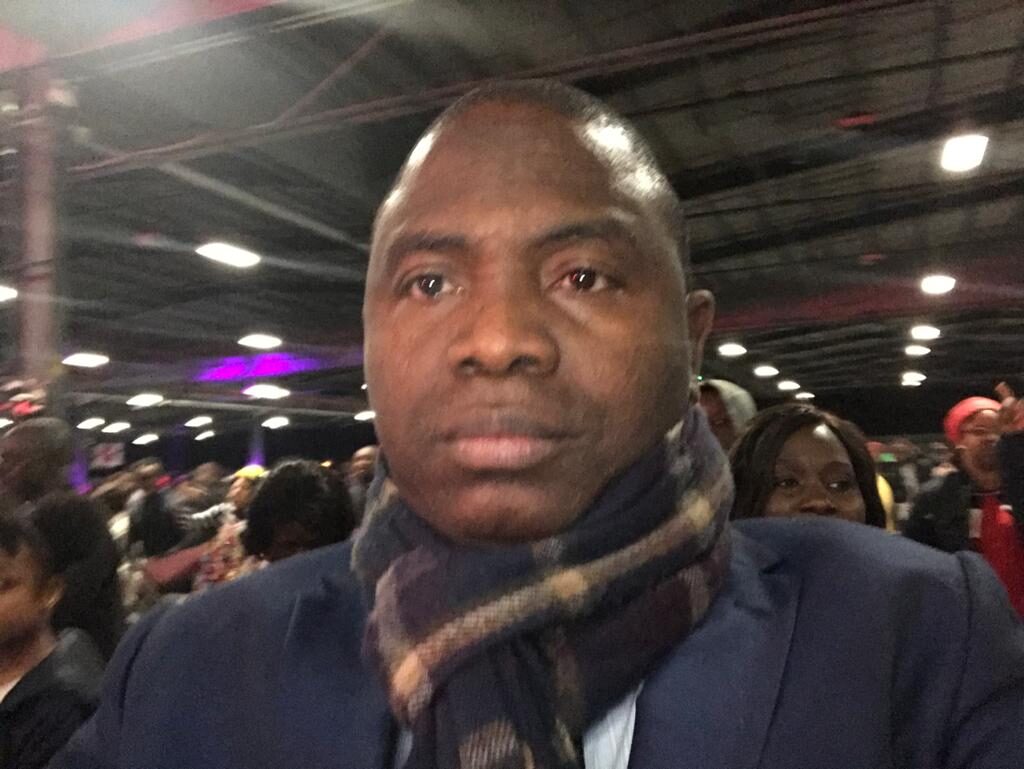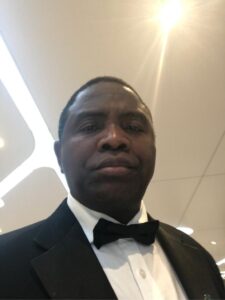2.7K
Pastor Victor Olubusola Joel practised as a Journalist in Nigeria from 1991 to 2002. He started with the defunct National Concord Newspapers as a youth corper and reporter. After his post graduate diploma in Journalism,he joined TheNews/Tempo Magazine and later, after his Masters programme in International Politics from the University of Lagos, he joined The Punch Newspapers where he rose to become a Chief Correspondent.He relocated to the United Kingdom about 18 years ago and has since trained at The University of Warwick for MA Social Work and the University of Birmingham for Higher Specialist Training in Mental Health Social Work.Pastor Joel is the Lead Pastor of RCCG Green Pastures, Leicester where he has been pastoring for about 15 years.Pastor Joel has passion for missions and church planting and has trained as a Tent Making Missionary both in Nigeria and the UK.He currently combines his pastoral work with his career as a specialist mental health social worker in the UK. He is married to Pastor Mrs Folasade Joel and they have two God-given miracle children. He spoke with Church Times’ GBENGA OSINAIKE on his years of pastoring in the UK.
You have been in the UK for a while as a pastor in the RCCG. What has been the experience?
It’s been an exciting one I must confess and at the same time a learning experience for me. I have had to keep learning and adapting to the changes I met when I came. I would have put in about 16 years pastoring here by October. We were first involved in a church plant in Nottingham in 2004 as the pioneer pastor along with my wife. After a year nurturing the parish, we had to return to Leicester where we live to plant another one in 2005. The distance from Leicester to Nottingham is about 50 minutes drive, so we had to hand over the church to another deacon at that time and planted another one close to where we live in Leicester.
I see that God is dynamic without changing the core of the message of redemption. The first Adam was created as a full-grown man but the last Adam came as a child and identified with us so God has a way of improving His own system in a dynamic and pragmatic way so we need to keep changing.
The setting here allows you to keep educating yourself. I have been used to posting in the Nigerian church for instance. At the end of every convention, we expected that pastors would be moved around. But here in the UK people are not posted around. I have been in the same parish for 15years and have not been moved. We left where we were before because we asked for it not because we were posted. So in the UK, there is a bit of freedom and latitude. The pastor here can be in a church for as long as he wants. Incidentally, the church we left in Nottingham has grown so well too. They have their own property now and have planted some churches. Here too we have been able to plant about four other parishes. So in essence I must say it’s been an exciting journey coping with a new environment.
You make it sound as if it’s easy to plant churches in the UK. How easy is it?
It is not as easy the way I’m presenting it. The first time we planted another parish apart from the one where I pastor now was in 2010. The general overseer of the RCCG, Pastor Enoch Adeboye had to compel us and at the same time encouraged us to plant more parishes. We were asked to plant 1000 more parishes and we were just about 450 parishes as at that time. The central office wrote a letter and asked us to plant two parishes from our own parish. For me, I like to obey authority. I believe what the authority over me says is what is good. But if it contradicts the basic principles of the Bible, I will go with the Bible. But part of the due diligence is to study the leadership before submitting to it. I have found that the leadership of the RCCG is reliable that is why I submitted to it in the first place.
It takes a lot of hard work to plant a church here. The process now is that before you plant a church you contact the central office of the RCCG in the UK, discuss with them and they can then give advice on what to do and where to locate the parish. We had a meeting with the regional head in the UK at a time and we discovered that less than 15 pastors out of more than 700 were less than 30 years of age. So we have a lot of older adult population in the pastorate. This is an indication that those who belong to the younger generation are not many in the pastorate and that is not too good for the church that has a growth orientation. If the old people die, the church dies automatically. I think that is why there is a need to drive for church growth and particularly use the younger generation.
Assuming I am entering the UK for the first time and want to start a church, how do I go about it?
It depends on your immigration status. If you are married to a British person it is easy. If you came to join your spouse, assuming your spouse has a working status here in the UK you can start a church too. There is no hard and fast rule about it. But the challenge comes when you begin to grow. To avoid whatever problem that may arise in the future when the church grows, it is better to inform the authority and register with the charity commission.
The law is that by the time your annual income is 5000 pounds you have to register as a charity. But churches don’t wait till then, they register with the charity commission at the outset. It is believed that the money entering into the church purse is not your money. It is public money. If your income is less than 5000 for instance, you may just do a skeletal statement of account. But if it is about £10,000 it has to go through a certified accountant and auditors who will carry out thorough scrutiny of the account and provide an accounting statement at the end of the day. In the RCCG we are advised to get one lawyer to do the registration with the charity commission for all the churches under the RCCG and it appears the Central Office pays for that. But independent churches have the liberty to get their own lawyers to do the registration with the Charity Commission.
What is expected of the church when it is registered with the charity commission and what does the church stand to gain?
Apart from the charity commission, there is a gift aids scheme. It is believed that the UK is a Christian country and they believe what you give to the church is given for the good of the public. The gift aid helps a lot of churches in the UK to have more money. The charity commission believes the goals and objectives of the church should be to advance the gospel and to help the poor. Those are the two things they expect the church to do. The gift aid scheme believes there must be a relationship between the money given to the church and the objectives. So when people donate money to the church, we can seek the consent of the people to make claims on their money from the government.
Last year we claimed from the British government thousands of pounds for instance because some of our members are taxpayers. But because they pay their taxes they are not spending the money on themselves and still donate to the church. The British government sees what you give to the church as a way of helping the poor. If a parishioner gives £1000 for instance to the church about 25 per cent of that money is returned to the church if the church makes a claim. The church will go to Inland Revenue and make claims based on the records of those who gave money. The church will say Mr. A has given us £5000. The church then claims the money from Inland Revenue because the person also pays tax. The claim depends on how the church wants it. It could be annual. That is why there are envelopes that we give to members who are giving to get their details and consent.
Now that we do online meetings the accountant will just go to the accounts of the church to capture the giving of each member. I think the objective is to be able to distribute part of the tax paid to the government to a charity. That can only be done if the charity organization, I mean the church in this case makes claims. There are billions of pounds that charities are not claiming. That is why charity organisations ask donors if they want claims to be made on their money. There is a consent of the giver for the church to make the claim.
It seems confusing. Is it that you may just pay money to the church and then be exempted from tax. How does the claim issue come in?
You would have paid the tax anyway especially if you are doing a formal job. But then the society is so organized and truthful that some people do self-assessment to pay their tax. There are those who are not in the payee system they do self-assessment to pay their tax. When these people give to a charity they also have a record. The Inland Revenue will know that you have not spent your earnings on yourself, it could reduce your taxes. Those who keep different jobs for instance can declare their earnings and pay tax from it. If these people also make donations to charities, they will be exempted from more taxation. The charity can make claims on the money they had already paid as tax.
Let’s go back to the issue of pastors and how churches are set up. Were you saying those who don’t have legal stay in the UK are not allowed to start a church for instance as missionaries?
If you don’t have papers, you can not start a church otherwise you will find yourself in big trouble. People can come in as ministers of religion if they have a church that would sponsor them but they must produce evidence that they have attended a bible college. Some people risk it and start a church because their spouse is going to school here in the UK But what happens when their spouse is through with school? So that is why we do get all the necessary papers to authenticate our stay.
But like I said, there is provision for people to come in as ministers of religion. But the person has to prove that he has been given a job and that the church is paying him. In our case, we have one or two slots to employ ministers of religion. But the minister of religion is expected to have gone to a Bible College. But there are still some people who don’t have a certificate who still practice as pastors. There was a plan that anybody that would pastor must be licensed. Pastors are expected to have attended National Advanced Bible College. The bottom line is that if you come in as a minister of religion you will be dealing with Inland Revenue, accountants, a lawyer like any other church leader. And you will be a victim of the growth of your church because the administration especially the spending will be subjected to public scrutiny.
But what if I just have a meeting room where we gather to study the Word and pray. Will that still be subjected to public scrutiny?
You can have a small room where you meet and may not register as a charity. But the average white man will not give you money they will be suspicious of you and see you as a fraud if you are not registered as a charity. But if you want to grow and have more funds for your operations, you need to come clean and open. You need to register with the charity commission and let them know your earnings. Your statement of account has to be a public document.
But why is it that many black churches don’t attract whites in the real sense to their services. Why do blacks populate many of the churches started by blacks?
I think it’s because of our attitude and the fact that we make too much noise in the black churches. The average white man can shout on the football field, but when it comes to church, they don’t want the kind of decibel. They believe we should speak to communicate not shout. Africans, especially Nigerians, are fast-paced in our preaching. They don’t understand us because of the noise level and then the fact that we talk about money too much. They talk about money too but in a subtle way. Our timing too is bad. We are too extreme and physical in our spiritual content. We present ourselves as angry when we are preaching. They will rather prefer somebody like the RCCG G.O because he speaks slowly and still communicates. They like it that way. Many white people come to black churches, but they don’t stay. The way some of our people react to them is like them versus us. We have a few white people who have raised some of these issues I’m raising. We are culturally too oppressive. We want to force our ways on people. I had to practically insist that our people should not sing native songs because by that we will be isolating some people. We don’t isolate others in our service. The issue of dressing is not an issue here, of course, we dress neatly but we don’t insist on the tie and suit.
With this understanding why are black pastors not complying?
There are places where they comply but they still do not attract the white. Our church in Sheffield was almost white but as more blacks came in, the white withdrew. I think also that there is a faulty module in our gospel. Our gospel is more of the transactional gospel. A brother in my church described it as pagan gospel. There is a parallel between what the Babalawos do and what we do in the church; that is if care is not taken. The devil brought in this form of the gospel in the 80s and the 90s There is some kind of transactional mentality in our gospel and since God answers these prayers we tend to keep doing it. Our leader in the UK said something like if 10 per cent our time is given to pray for the UK the country would have changed. Churches that do more of what God wants will experience growth.






1 comment
[…] an interview with Church Times, Joel, a former journalist, said the noise and physical approach to spiritual activities is a turn […]